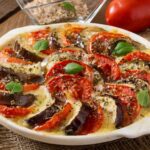Algeria, a North African country with a rich cultural heritage, boasts a diverse and flavorful cuisine that reflects its historical influences and regional diversity. Algerian cuisine combines Berber, Arabic, Mediterranean, and French culinary traditions, resulting in a delightful array of dishes. In this article, we embark on a culinary journey to discover the top 10 most eaten foods in Algeria, showcasing the country’s gastronomic treasures.
- Couscous: Couscous is the crown jewel of Algerian cuisine, considered a staple and a symbol of hospitality. This fluffy semolina grain dish is typically served with a rich stew of meat (such as lamb, chicken, or beef), vegetables, and aromatic spices. Couscous is enjoyed on special occasions and family gatherings, bringing people together around a communal dish.
- Tajine: Algerian tajine is a slow-cooked savory stew prepared in a distinctive earthenware pot. It features a variety of ingredients, such as meat (lamb, chicken, or beef), vegetables, aromatic herbs, and spices. The slow cooking process allows the flavors to meld together, resulting in a tender and flavorful dish.
- Chakhchoukha: Chakhchoukha is a traditional Algerian dish made from shredded pieces of baked flatbread soaked in a tomato-based sauce and topped with a flavorful mixture of meat (lamb or beef), chickpeas, vegetables, and spices. It is a hearty and satisfying dish that is often enjoyed during celebrations and festivals.
- Merguez: Merguez is a popular Algerian sausage made from ground lamb or beef, seasoned with a combination of spices, including chili pepper, cumin, and garlic. These flavorful sausages are grilled or pan-fried and commonly served with bread, couscous, or in sandwiches.
- Shakshuka: Shakshuka, a dish of poached eggs in a spicy tomato sauce, has become a beloved breakfast and brunch option in Algeria. The eggs are gently cooked in a flavorful mixture of tomatoes, onions, peppers, and spices, creating a delightful combination of flavors. It is often accompanied by crusty bread for dipping.
- Makroudh: Makroudh is a traditional Algerian pastry that combines the richness of dates with a semolina-based dough. The dough is filled with a sweet date paste, shaped into diamond or oval shapes, and deep-fried until golden and crispy. Makroudh is a popular sweet treat enjoyed during festive occasions and religious holidays.
- Chorba: Chorba is a hearty Algerian soup known for its comforting qualities. It is typically made with a base of meat (lamb or chicken), vegetables, legumes (such as lentils or chickpeas), and fragrant spices. Chorba is served hot and often accompanied by bread, providing nourishment and warmth, especially during the colder months.
- Sfouf: Sfouf is a traditional Algerian cake made from semolina, turmeric, and almond flour, giving it a vibrant yellow color and a unique flavor profile. This moist and fragrant cake is sweetened with honey or sugar and often garnished with sesame seeds. Sfouf is a popular dessert enjoyed with tea or coffee.
- Brik: Brik is a savory Algerian pastry that consists of thin pastry sheets filled with a mixture of eggs, tuna, parsley, capers, and spices. The pastry is folded into a triangular shape and deep-fried until golden and crispy. Brik is a popular street food snack, bursting with flavors and textures.
- Harira: Harira is a traditional Algerian soup commonly associated with the holy month of Ramadan. This thick and hearty soup is made with a combination of lentils, chickpeas, meat (usually lamb or beef), tomatoes, onions, and fragrant spices. Harira is consumed to break the fast during Ramadan and is considered nourishing and comforting.
Algerian cuisine tantalizes the taste buds with its vibrant flavors, diverse ingredients, and cultural influences. From the iconic couscous and tajine to the comforting chorba and sweet delights of makroudh, the top 10 most eaten foods in Algeria offer a glimpse into the country’s culinary heritage. Algerian cuisine celebrates the art of communal dining and the joy of savoring delicious meals, reflecting the warmth and hospitality of its people.








